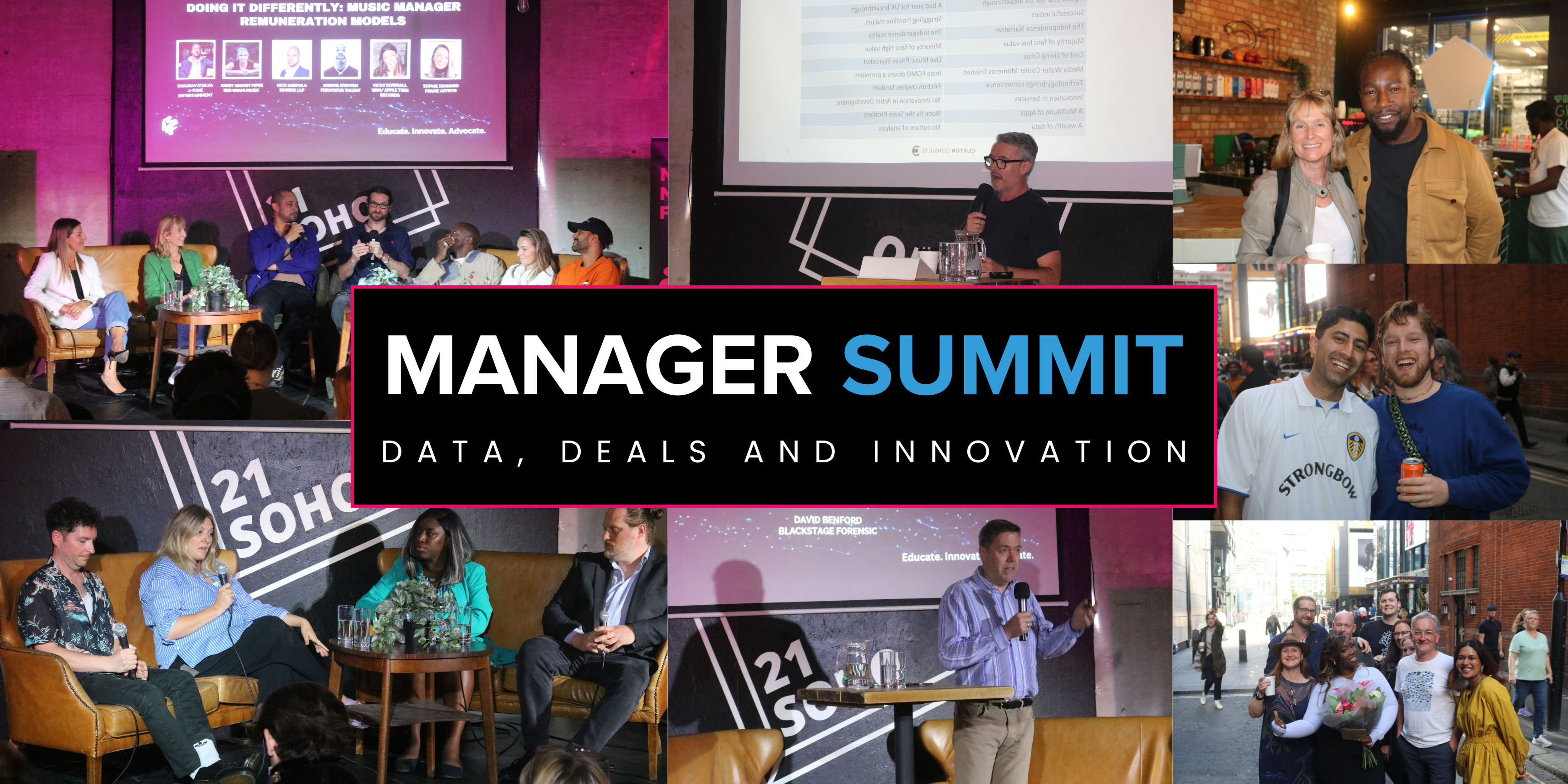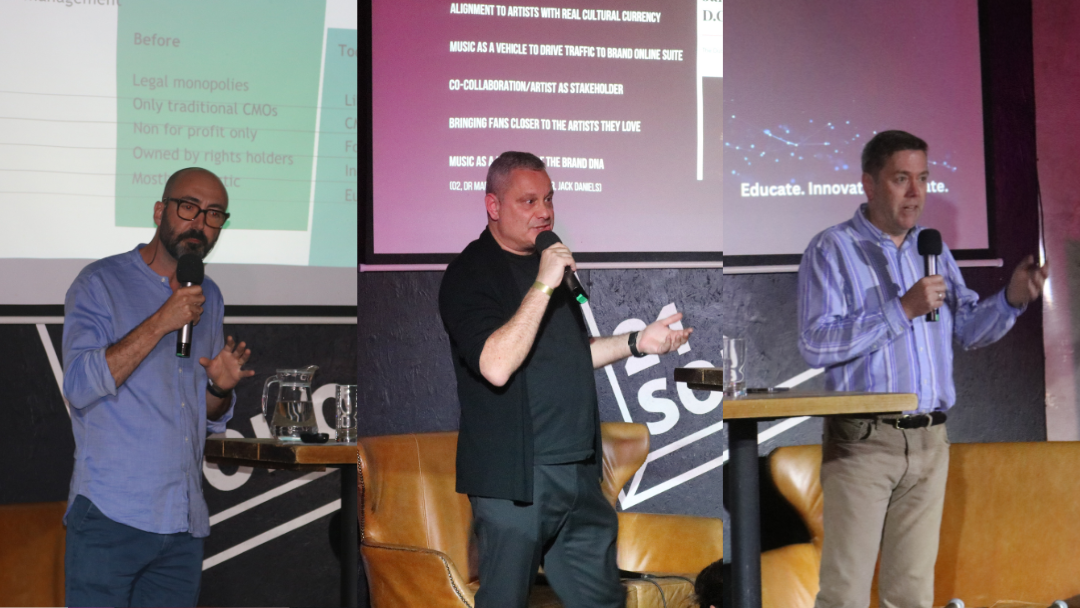MMF Manager Summit Review 2024
Hosted at 21Soho on Tuesday 17th September, the MMF’s 3rd annual Manager Summit attracted another sell-out room of attendees for a fascinating day of discussion and debate on everything from changing commercial models of music management, to the utilisation of fan data, the potentials of brand partnerships and the importance of cyber security.

Kicking off at 11.30am, we were delighted to welcome one of the UK’s leading music business thinkers, Patrick Clifton, for a keynote address on the state of the recorded market.
In an streaming ecosystem seemingly dominated by US megastars, Patrick outlined some of the underlying challenges facing DSPs and major labels – not least their ability to create genuine connections with “superfans” in an era when recorded music has become commoditised. Fittingly, he also highlighted the importance of data and need for the industry to better manage the torrent of information from streaming, ticketing and social media.
His conclusion?
The future requires a new kind of “evolved music company”. One with a basic broad purpose of vision, which can connect great music to culture, and is capable of working with artists across all aspects of their career and incentivised to deliver long-term success.

In fact, not unlike the “evolved music companies” represented by MMF members….
From this “big picture” review, attention turned to one of the most frequently discussed issues within the MMF community – the feasibility of commission-based business models (especially in the current day music business) and how MMF members are adapting to alternative models in order achieve sustainability.
Leading this discussion, MMF Chief Executive, Annaballa Coldrick, presented findings from a new report, the Managers Deals Guide, part of our ongoing Managing Expectations series, that explores the pros and cons of these models in detail.
As Annabella concluded, there is no one size fits all approach to music management. There are a myriad of approaches. The real challenge is how a manager articulates the value that they bring to their client.
The report is available to download from the MMF website here.
That challenge was further reiterated in a short video presentation from Guy Morrow, Senior Lecturer at the University of Melbourne and author of a recent book, Music Artist Managers: Remuneration & Retention in the Popular Music Business, and in our first panel, moderated by Paul Bonham and featuring Shaurav D’Silva (2-Tone Entertainment), Kerry Harvey-Piper (Red Grape Music), Nick Eziefula (Simkins), Kwame Kwaten (Ferocious Talent), Vicky Dowdall (VDM / Apple Tree Records) and Sophie Kennard (Frame Artists).

As highlighted by Nick, aside from the fiduciary duty of a manager towards their client, there are no hard and fast rules over how their contractual agreement should be constructed – and, in fact, there should arguably be more innovation in this area; including managers negotiating a share of rights ownership, especially where they have contributed direct financial investment.
Ultimately, all parties should be incentivised towards sustainable long-term relationships built on transparency.
All the panellists spoke candidly about how they were already employing a wide variety of different models – all tailored around the specific demands of their clients.
For Sophie, whose roster includes Chase & Status, the “standard” 20% commission is already a rarity in the electronic space, where many artists remain permanently “in cycle”. When taking on a new client, she recommended waiting for 9-12 months before establishing the basis of a commercial agreement.
Kwame, meanwhile, explained the working of the “Fan Deal” model he has pioneered at Ferocious – where team members involved in a specific project (for example, PR or pluggers) receive a small ownership of rights in lieu of payment. This ensures the artist can benefit from their expert support, while ensuring everyone is incentivized to make the project a success.
When everything else is changing, he concluded, it’s crazy for management to stay the same. This conversation is demonstrating to everyone that it’s time for some major changes.

There were some notes of caution. While artists, songwriters and producers are generally encouraged to retain ownership of their rights, it requires a clear explanation from managers about the value they are adding to justify why they should be given master points. As highlighted by Shaurav, in the current ecosystem, some artists can achieve an extraordinary level of internet fame and fortune – managers will need to explain their worth, and how they can help build sustainability and creative businesses.
Kerry explained how she juggles different roles for different clients – including tour management – and adapts her commission structure accordingly. She also revealed there is a post-it-note on her desk that reads: ‘I am not the artist’s parent. I am not their best friend. I am their business partner!’
As a former artist herself, Vicky talked in great detail about the vital importance of personal relationships, as well as the experience of launching a 50/50 joint venture record label with Nina Nesbitt.
It was fascinating and insightful, and we hope the MMF’s upcoming report continues to bring this conversation out into the open.

After lunch, proceedings picked up with a second panel on the topical issue of fan data and cultivating online audiences – moderated by the brilliant Christine Osazuwa, with Lisa Ward (Red Light Management), Tom Burriss (Zephyr / Prime Element) and Peter Mason (Wiggin LLP).
As with the earlier discussion on management business models, this provided another excellent primer into how the experts are using the vast range of tools available to managers, tips on campaign building and pitfalls to avoid.
One insight, made repeatedly, was that many of these tools are free.
Tom namechecked the likes of Chartmetric, Shopify and Mailchimp, as well as analytics provided by the likes of Spotify and Instagram. He also flagged the importance of story-building and strategy. When there’s such competition for attention, it is vital to nurture relationships carefully.
As Lisa explained, the small stuff is also important. Once you’ve gone to the lengths of employing data tools and running a campaign, it’s absolutely critical that URLs aren’t broken, that shipping services work, and signing-up processes are faultless. These granular mechanisms can mean more than the big grand gestures.
Lisa also highlighted that, although everyone likes to focus on data, it’s easy to get bogged down and, at the end of the day, when it comes to the really important stuff – the music – that’s not impacted by analytics at all. Everything has to be complementary and designed around the artist. Some want to be engaged in everything, others don’t want to be on socials – or even to engage directly with their fanbase.
Different strokes, for different folks!

In terms of challenges, Peter outlined the importance of attempting to centralise data (*everyone agreed that ticketing data, the source of the biggest superfans, is still far too difficult to access*) and the role of the manager in claiming ownership of data where possible, ensuring that partners (eg labels, promoters, publishers) are working in unison where possible, and that due diligence is being performed.
As he succinctly explained, despite a lot of services starting up in this area and a lot of big claims being made – there’s sometimes not enough investigation about whether they deliver, or whether they’re compliant with regulations like GDPR.
The agenda concluded with three punchy Summit Shorts, from Blackstage Forensic’s David Benford (a fascinating glimpse into the world of cybersecurity, that raised an abundance of questions!); from Simpatico’s Gary Cohen on how managers could capture some of the $6bn currently being poured into live music by brands; and from Unison’s Jordi Puy on the liberalisation of collective rights management, getting songwriters paid quicker and for lower admin fees.

Their presentations, and those from earlier in the day, are available in the members section of the MMF website.
Following the Summit, the MMF AGM kicked with a flurry of announcements and campaign updates:
- 4 new board members: welcome Marit, Paul, Shaurav and Tania!
- 1 member re-elected: congratulations Sandy!
- 4 members step down: thank you Clare, Karl, Nike and Ross.
- Upcoming developments on reforms of streaming and AI, plus overseas touring and ticketing. The latter led by the MMF, and featured specifically in the Labour manifesto.
- Upcoming events, including the Artist & Manager Awards. November 21st. Get your tickets now! And our advanced managers retreat in January 2025.
- Updates on education courses, and piloting a manager certification system based around our education programme.
- A presentation by Ross Patel on an environmental and sustainability clause for artist’s live contracts.
- Some exciting developments in the works with Music Minds Matter supporting managers mental health.
And finally, a special “farewell” to our beloved Chair and Vice-Chair, Paul Craig and Kwame Kwaten after 6 years of service.
After receiving custom-made Artist & Manager Awards, both will now join the MMF’s Custodians Council.
A new Chair and Vice Chair will be announced in early October.